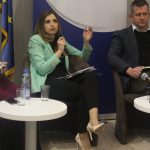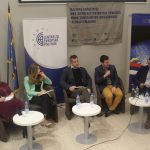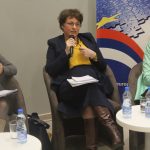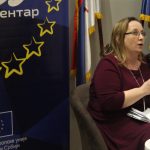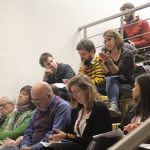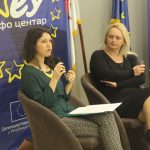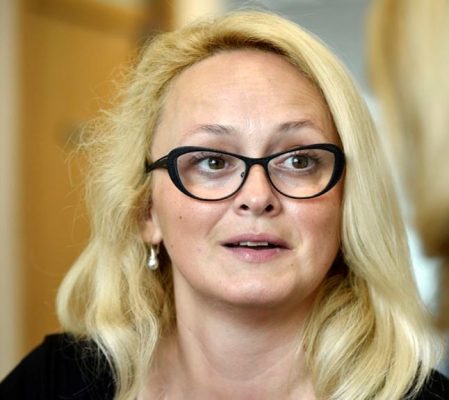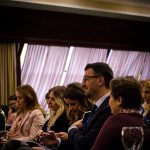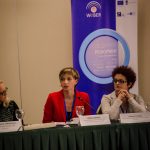What’s the role and importance of think tank organisations today?
30th January 2018 – Final conference of the International Visegrad Fund Project “Raising capacities and advocacy potential towards more substantive involvement of civil society organisations of Visegrad group and Western Balkan countries” was held today in Belgrade. Within the Conference named Think tanks in policymaking: Challenges and impact in Southeast Europe, annual Go To Think Tank Index Report for 2017 was presented; Report has been published for 11 years and presents annually evaluation of think tanks worldwide. Today, in 75 countries, events dedicated to presentation of the Go To Think Tank Index Report were held on the same day. This year, Report has been presented for the first time in Serbia, in organisation of European Policy Centre (CEP).
Final conference was organized in two panels. First panel named Transparency and Inclusiveness in Policymaking: State of Play in the Western Balkans brought discussion about Western Balkans` experiences regarding position of think tanks. Policymaking in Western Balkans is continuously characterized by poor and unsystematic involvement of civil society organizations (CSOs); on the other hand, the need that process of creation and adoption of policies is based on accurate information, as well as that contribution which think tank organizations provide to state authorities is evidence based and containing verified data is today bigger than ever, especially having in mind trend of democracy regression and growing information manipulation in South-east Europe.
Ms Milena Milošević, researcher in Institute Alternative from Montenegro, moderated first panel discussion. Panelist were Ms Milena Banović, Head of Department for Planning and Creating Enabling Environment for the Development of Civil Society, Office for cooperation with Civil Society, Ms Sanja Mešanović, acting Deputy Director of Republic Secretariat for Public Policies, Mr Radu Cotici, expert from Regional Cooperation Council (RCC), Ms Lejla Ramić-Mesihović, Director of Foreign Policy Initiative from Bosnia and Herzegovina and Ms Dragana Bajić, researcher from CEP.
Мilеnа Bаnоvić from The Office for cooperation with civil society emphasized the importance of the Office and its activities aimed to contribute to better cooperation among public administration organizations and civil society organizations. Also, she presented advantages and weaknesses of different models of cooperation among mentioned organisations.
In the creation of public policies, it is necessary to be guided by a smart choice, which means that public policies should be formed based on data and managed according to the results, thinks Ms Sanja Mešanović. She adds that it is particularly important that these policies are characterized by transparency.
Results of the regional public opinion survey „Balkan Barometer“ are presented by Mr Radu Cotici. He spoke about biggest problems that civil society encounters when communicating with state authorities, as well as which recommendations RCC gives in order to improve the current state.
Ms Lejla Ramić-Mesihović looked back on positive and negative aspects of CSOs participation in the process of policymaking. Although CSOs give huge contribution to state authorities, they at the same time make mistakes, she added.
Within second panel named Bridging Decision-Making and Expert Knowledge: what role for think tanks, participants disussed about experiences of Visegrad Group countries (Hungary, Czech Republic, Slovakia and Poland), as well as how much exchange of experiences among these countries and Western Balkan countries can help both. Panelists also discussed role and position of think tanks today, through the prism of publishing above mentioned 2017 Go To Think Tank Index Report.
For the first time, this year CEP was evaluated and was ranked on the list of best European think tanks. Besides, the Think for Europe network, which consists of 6 CSOs from the Western Balkan, and whose work is coordinated by CEP, is on the list of the world’s best think tank networks.
Mr Srđan Majstorović, President of the CEP Governing Board moderated the panel, and panelists were Mr Michal Vit, fellow researcher for Czech organization EUROPEUM, Mr Andrew Cartwright, professor at Central European University from Budapest, Ms Sonja Stojanović Gajić, director of Belgrade Centre for Security Policy and Ms Milena Milošević from Institute Alternativa, this time in the role of panelist.
„I think that the most important thing which our organization currently does is development and participation in regional cooperation with other organizations from Western Balkan, as well as participation in regional initiatives for supervision of state institutions` activities“, said Milošević.
Sonja Stojanović Gajić warned that we, often guided by the facts, forget how important it is to affect the emotions of people. Therefore, it is not enough just to present research in the form of figures and information, but we should present the atmosphere and how people feel, she added.
„Support to populist political parties has been growing because they are aware of the importance of the impact on citizens` emotions and they abundantly use this fact“, highlighted Stojanović Gajić.
Panelists eventually agreed that the role of think tanks in the world of increasing global insecurity and the growth of authoritarianism is more important than ever and that work on strengthening cooperation among think tanks should be done.

